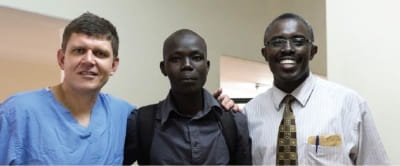Making Headway
January 01, 2016
Head and neck outreach program in Uganda strengthens undersized health care infrastructure
Innovations in Otolaryngology - Head & Neck Surgery - Winter 2016 Download PDF
 Chad Zender, MD
Chad Zender, MD“There are about 15 of these physicians in a country of 33 million people,” says Chad Zender, MD, Head and Neck Surgeon University Hospitals Case Medical Center and UH Ear, Nose & Throat Institute and Associate Professor of Otolaryngology, Case Western Reserve University School of Medicine.
This physician shortage can become a vicious cycle, feeding on itself by driving newly trained otolaryngology specialists away.
“Uganda has one of the largest medical schools in East Africa, but because of infrastructure challenges there, there’s a ‘brain drain’ that occurs,” Dr. Zender says. “Ugandan physicians tend to go to other countries where the medical infrastructure is a little stronger. There’s also the difficulty people have in traveling to the cities where the majority of the otolaryngologists are located. The bottom line is that there’s a huge lack of access and challenge getting to limited number of physicians that are there.”
To address these challenges, Dr. Zender and his nurse partner, Katrina Harrill, RN, lead a group of ENT specialists from UH and Case Western Reserve University School of Medicine to Uganda twice a year for two-week surgical camps. The group of about seven typically includes a mix of physicians, nurses, fellows, residents and medical students. During their first trip In November 2014, the team performed 10 surgeries – the first at the Uganda Cancer Institute (UCI) – and provided a cadaver course and lectures to medical students and residents at Makerere University, working with Ugandan head and neck surgeons Jeff Otiti, MD, and Justine Namwagala, MD, and UCI director Jackson Orem, MD.

In May 2015, the team returned and were joined by a group from Vanderbilt University, which was led by James Netterville, MD. Together, they performed 40 operations. In October 2015, the Cleveland group did 30 surgeries. “It runs the gamut,” Dr. Zender says. “Procedures include everything from exams under anesthesia to assess a patient’s airway to removing salivary gland tumors to major, eight-to-10-hour procedures that require removing large jaw tumors and reconstruction with free tissue transplantation. Our fundamental objective is to do good work one patient at a time. The secondary goal of improving health care through physician, resident and nursing education happens with each of these individual patient encounters, which has a truly lasting and global impact.”
The Ugandan outreach effort has its roots in research conducted by UH infectious disease specialist Robert Salata, MD, also Professor of Medicine at the School of Medicine. “That’s how I got interested, by looking at some head and neck research opportunities over there,” Dr. Zender says. “That’s how I met Dr. Otiti.”

Currently, Dr. Zender is pursuing a couple of different research avenues centered on HPV, HIV and head and neck cancer. “As an extension of Dr. Salata’s work in cervical cancer in Africa, we’re working with Dr. Matt Cooney and Dr. Aaron Weinberg, in addition to the Ugandan physicians, to study the incidence of HPV-associated head and neck cancer in Uganda and the different genotypes of strains of HPV that could be involved,” he says. “Are there differences between HIV-positive and HIVnegative individuals? This would also have implications regarding vaccination. However, what started as a research collaboration has evolved into an outreach program that is quite unique, incorporating research, service work and education all in one.”
Funding for the entire outreach effort has come from philanthropic gifts, a grant from the Center for AIDS Research and a gift from UH Ear, Nose & Throat Institute Director Cliff Megerian, MD, which he received from the Healthnetwork Foundation as recipient of its Service Excellence Award. This gift, in particular, has made it possible for ENT residents to make the trip to Uganda.
For Dr. Zender, taking colleagues along is one of the most valuable parts of the program.
“One of the most rewarding aspects is seeing the impact of these trips on the individuals I take over with me, which is really a blessing,” he says. “It allows us all to learn from the Ugandans about the involvement of families and how other societies deal with health care issues. Seeing how involved the patients’ families are in taking care of their loved ones is truly remarkable.”
For more information about the ENT outreach program in Uganda, email Chad.Zender@UHhospitals.org.
Tags:


